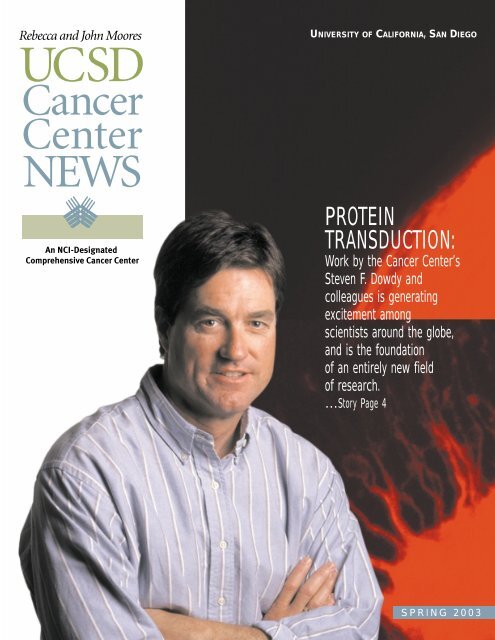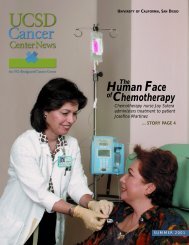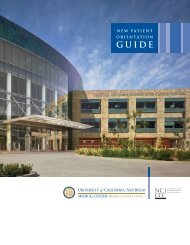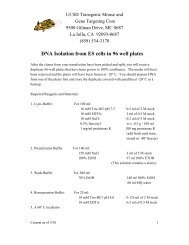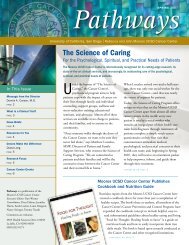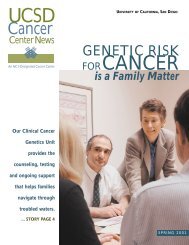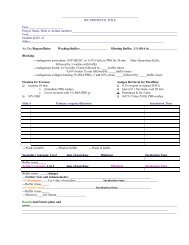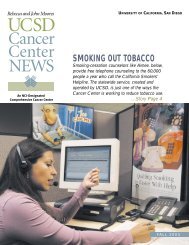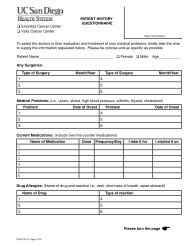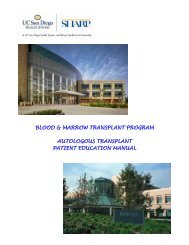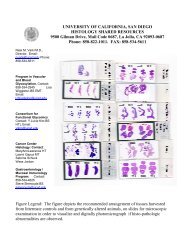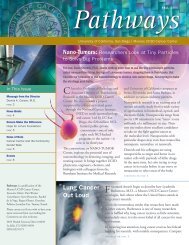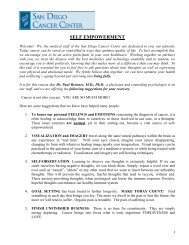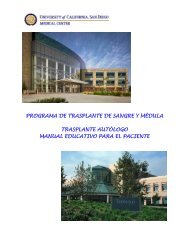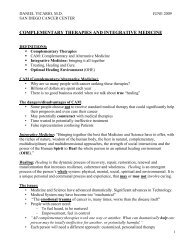PROTEIN TRANSDUCTION: - Moores Cancer Center
PROTEIN TRANSDUCTION: - Moores Cancer Center
PROTEIN TRANSDUCTION: - Moores Cancer Center
You also want an ePaper? Increase the reach of your titles
YUMPU automatically turns print PDFs into web optimized ePapers that Google loves.
UNIVERSITY OF CALIFORNIA, SAN DIEGO<br />
<strong>PROTEIN</strong><br />
<strong>TRANSDUCTION</strong>:<br />
Work by the <strong>Cancer</strong> <strong>Center</strong>’s<br />
Steven F. Dowdy and<br />
colleagues is generating<br />
excitement among<br />
scientists around the globe,<br />
and is the foundation<br />
of an entirely new field<br />
of research.<br />
…Story Page 4<br />
SPRING 2003
UCSD <strong>Cancer</strong> <strong>Center</strong> Foundation<br />
PRESIDENT OF THE FOUNDATION BOARD<br />
Cinda K. Lucas *<br />
OFFICERS<br />
Gordon P. Boerner *<br />
Marilynn Boesky *<br />
Howard I. Cohen *<br />
William T. Comer, Ph.D. *<br />
Frank M. Goldberg *<br />
Charles F. Gorder Sr., Esq. *<br />
Mary Rand Taylor *<br />
John McDonnell *<br />
BOARD OF DIRECTORS<br />
J. Samuel Armstrong, IV<br />
Terry Ash<br />
Kathryn A. Bernert, Esq.<br />
Howard C. Birndorf<br />
Sophie Brody<br />
Deborah J. Case<br />
Carol L. Chang<br />
Jay de Groot<br />
Charles Faith<br />
Yehudi Gaffen<br />
Howard Goldfeder*<br />
Donald W.Grimm<br />
Andre R. Horn<br />
Ernest Huang, Ph.D.<br />
Al Hugo-Martinez<br />
Jacqueline Johnson, Ph.D.<br />
Maurice C. Kaplan, Esq. *<br />
Jerome S. Katzin, Esq. *<br />
Jeffrey Lipinsky<br />
George L. Liggins,<br />
M.P.H., Ph.D.<br />
Joany Mosher<br />
Henry L. Nordhoff<br />
Carrie O’Brien<br />
Anne S. Otterson<br />
John W. Otterson, II<br />
Cynthia Polak<br />
Kenneth D. Polin, Esq.<br />
ADVISORY BOARD<br />
John R. Bonn, Esq.<br />
Diane Clarke<br />
Lois J. Crandell<br />
Audrey S. Geisel<br />
George L. Gildred<br />
Irwin Jacobs, Ph.D.<br />
Richard Levi<br />
Art Lujan<br />
Marianne McDonald, Ph.D.<br />
John H. Moxley III, M.D.<br />
Peter Preuss<br />
Clayton D. Pruett<br />
Ruth L. Schulman<br />
John Walton<br />
Walter Zable<br />
EX OFFICIO MEMBERS<br />
Robert C. Dynes, Ph.D.<br />
Edward W. Holmes, M.D.<br />
Robert Horsman<br />
Katherine Kennedy<br />
Sam Iacobellis, Ph.D.<br />
Esther R. Nahama<br />
Tom Nielsen<br />
Rebecca Newman<br />
INTERIM DIRECTOR, MOORES<br />
UCSD CANCER CENTER<br />
Gordon Gill, M.D.<br />
DEPUTY DIRECTOR,<br />
CLINICAL OPERATIONS<br />
David W. Easter, M.D.<br />
DEPUTY DIRECTOR,<br />
RESEARCH OPERATIONS<br />
Thomas J. Kipps, M.D., Ph.D.<br />
ASSOCIATE DIRECTOR FOR<br />
ADMINISTRATION<br />
Ira S. Goodman<br />
DIRECTOR OF DEVELOPMENT<br />
Sarah Godfrey<br />
ASSISTANT DIRECTOR OF<br />
DEVELOPMENT<br />
Cheryl D. Coate<br />
DEVELOPMENT ASSISTANTS<br />
Christa Collins<br />
Maryann Lapthorn<br />
Jennifer Mann<br />
* Officers and Members of the Executive Committee<br />
<strong>Moores</strong> UCSD <strong>Cancer</strong> <strong>Center</strong> News is a publication of the<br />
UCSD <strong>Cancer</strong> <strong>Center</strong> Foundation. Comments are welcome.<br />
UCSD <strong>Cancer</strong> <strong>Center</strong> Foundation<br />
9500 Gilman Drive MC 0658<br />
La Jolla, CA 92093-0658<br />
(858) 822-0022<br />
Executive Editor: Sarah Godfrey • Editor: Nancy Stringer<br />
Contributing Writers: Cheryl D. Coate, Sarah Godfrey, Nancy<br />
Stringer • Cover Photo: Dave Siccardi • Design: Janice Gordon<br />
Message<br />
from the<br />
Director<br />
As many of you may know,<br />
at the end of last year Dr. David<br />
Tarin stepped down as director of<br />
the <strong>Cancer</strong> <strong>Center</strong> to return full<br />
time to his research, teaching and<br />
clinical activities at UCSD. At that<br />
time, I was named as the interim<br />
director to maintain the <strong>Center</strong>’s<br />
forward momentum, and to continue its operations in a seamless<br />
fashion while the university conducts an international search for<br />
Dr. Tarin’s successor.<br />
It is an honor to serve as interim director of the <strong>Cancer</strong><br />
<strong>Center</strong>, an organization I’ve been a part of since its founding<br />
in 1979.<br />
My UCSD roots go back even further. I’ve been a member<br />
of the UCSD faculty since 1969 when the School of Medicine<br />
was in its infancy. In those early days, there were no buildings<br />
on our medical school campus! We rented space at the Salk<br />
Institute, where we conducted research and went about the<br />
business of organizing the curriculum and planning the facilities<br />
for a brand new school.<br />
That was an extraordinarily exciting time and, in many ways,<br />
is similar to the excitement and energy all of us who are involved<br />
in cancer feel with the new <strong>Cancer</strong> <strong>Center</strong> facility coming to life.<br />
As the building takes shape, it acts as a catalyst to focus our<br />
efforts on major decisions that will impact the future of the<br />
<strong>Center</strong>.<br />
One of the most important decisions is the recruitment of a<br />
permanent director, and there is good news on this front. UCSD<br />
has assembled a stellar search committee that is actively interviewing<br />
candidates, all of whom are nationally prominent figures<br />
in the cancer field. We are pleased both with the number of candidates<br />
who have expressed interest in coming here, and with the<br />
quality of the candidates. As you might imagine, the recruitment<br />
process for such an important position is lengthy, but we hope to<br />
be able to announce a new director later this year.<br />
In the interim, the leadership and members of the <strong>Cancer</strong><br />
<strong>Center</strong> are engaged in an internal evaluation process, looking<br />
at our current strengths and identifying areas to expand and<br />
enhance. Out of this process will emerge our strategic goals —<br />
an important aspect of our transition to the new <strong>Cancer</strong> <strong>Center</strong><br />
building, scheduled to open in Fall 2004.<br />
Another area of activity as we plan for occupancy of the new<br />
facility is that of continuing to build and strengthen our clinical<br />
programs and our clinical research. In line with that, in this issue<br />
<strong>Cancer</strong> <strong>Center</strong> News<br />
2
of the newsletter, on page 9, we<br />
introduce three new members<br />
of our <strong>Cancer</strong> <strong>Center</strong> family —<br />
clinical counselor Cynthia Sava,<br />
medical oncologist Lakshmi<br />
Vemuri, and cancer pharmacist<br />
Susan Wilson.<br />
In future issues we will bring<br />
you news of additional recruitments<br />
of clinicians with expertise<br />
in clinical research, particularly<br />
of innovative therapies. We are<br />
continuing to actively recruit to<br />
enhance our ability to translate<br />
new discoveries into more<br />
effective therapies.<br />
To better understand the<br />
importance of clinical research<br />
in our ongoing efforts to<br />
improve care for patients, I hope<br />
you will read the feature article<br />
about cancer vaccines on page 6.<br />
This article showcases exciting<br />
clinical research under way now<br />
at the <strong>Cancer</strong> <strong>Center</strong> that may<br />
lead to improved care for lymphoma<br />
patients.<br />
Clinical research and, ultimately,<br />
new standards of clinical<br />
care are founded upon basic<br />
science discoveries. Our cover<br />
story focuses on an intriguing<br />
new field of basic research called<br />
protein transduction, which is<br />
generating excitement among<br />
scientists around the world and<br />
holds tremendous promise<br />
for a broad range of clinical<br />
applications.<br />
We hope you enjoy learning<br />
about new developments at the<br />
<strong>Cancer</strong> <strong>Center</strong> as much as we<br />
enjoy sharing them with you.<br />
Sincerely,<br />
Gordon Gill, M.D.<br />
Interim Director,<br />
<strong>Moores</strong> UCSD <strong>Cancer</strong> <strong>Center</strong><br />
Introducing…Gordon Gill, M.D.<br />
Adistinguished physicianresearcher,<br />
Dr. Gordon Gill has<br />
been a member of the UCSD<br />
faculty for 34 years. During his tenure<br />
at UCSD, he has served as chief of the<br />
Division of Endocrinology and<br />
Metabolism in the Department of<br />
Medicine (1971-95) and was associate<br />
chair for scientific affairs in the<br />
Department of Medicine (1992-95).<br />
Most recently he served as Dean for<br />
Scientific Affairs for the School of<br />
Medicine.<br />
He received his undergraduate<br />
and medical degrees from Vanderbilt<br />
University. After serving a residency<br />
and a National Institutes of Health<br />
post-doctoral fellowship at Yale-New<br />
Haven Hospital, he joined the UCSD<br />
faculty during the first year it taught<br />
medical students.<br />
IN THIS ISSUE<br />
4 Cover Story:<br />
Protein Transduction<br />
6 <strong>Cancer</strong> Vaccines<br />
7 Know Your<br />
Breast <strong>Cancer</strong> Risk<br />
8 Construction Update<br />
9 New Clinical Staff<br />
10 Development News<br />
12 The Last Word<br />
Dr. Gill has served on numerous<br />
scientific boards and the editorial<br />
boards of many professional journals.<br />
Since 1995 he has been an associate<br />
editor of Cecil’s Textbook of<br />
Medicine. He is also a fellow of the<br />
American Academy of Arts and<br />
Sciences, and is a recipient of<br />
Research Career Development and<br />
MERIT awards from the NIH.<br />
His research has often focused<br />
on molecular abnormalities leading<br />
to malignant transformation, and<br />
his clinical practice in internal<br />
medicine and endocrinology has<br />
included a special interest in thyroid<br />
cancer and endocrine tumors. He<br />
holds a research grant from the NIH<br />
that is in its 36th year of continual<br />
funding, a rare accomplishment<br />
among scientists.<br />
ON THE COVER: The two cells, shown in red, illustrate the power<br />
of protein transduction to change the biology of human cells. In the laboratory, two types<br />
of the same protein, known to alter membrane architecture, were delivered into the cell<br />
membranes. In the top panel, the protein contained an inactivating mutation and the cell<br />
surface remained smooth. In the bottom panel, using a version containing an activating<br />
mutation, spikes appeared within 10 minutes in more than 95 percent of the cells.<br />
3<br />
<strong>Cancer</strong> <strong>Center</strong> News
SPECIAL DELIVERY:<br />
Supersize Cargoes<br />
Pack<br />
Big<br />
Molecular<br />
V<br />
Punch<br />
irtually all drugs that carry out their healing<br />
mission inside of cells are comprised of small<br />
molecules. Not because small molecules<br />
make the best drugs, but because the cell only<br />
allows small molecules to penetrate the pores of its<br />
protective cell membrane.<br />
Now a team of <strong>Cancer</strong><br />
<strong>Center</strong> researchers led by<br />
Steven F. Dowdy, Ph.D.,<br />
is rewriting the laws of<br />
pharmacology with the<br />
development of a method<br />
to slip large, informationrich<br />
molecules such as<br />
enzymes and proteins<br />
past the cell’s membrane.<br />
The team’s technique<br />
for inserting molecules<br />
hundreds of times larger<br />
than previously thought<br />
possible is called protein<br />
transduction. It is the<br />
foundation of an entirely<br />
new field of study that<br />
in the last four years has<br />
exploded, with more than<br />
1,000 laboratories around<br />
the globe now conducting<br />
research based upon Dowdy’s method.<br />
He and colleagues wrote two landmark papers in<br />
1999 proving the principle that you could ferry large<br />
molecules through the cellular membrane and have<br />
Steven Dowdy (center) reviews lab images with graduate students (l-r)<br />
Eric Snyder, Courtney Havens and Bryan Meade. Above right: A mouse<br />
model of human ovarian cancer provides a dramatic illustration of<br />
protein transduction. Fifteen minutes after injection of a peptide<br />
(green), most cells in the abdominal cavity, where ovarian cancer<br />
cells have invaded, have taken up the peptide.<br />
them intact and functioning<br />
inside the cell. This is done<br />
by chemically snipping out<br />
a particular segment of a protein.<br />
The segment, called a<br />
protein transduction domain<br />
(PTD), is positively charged.<br />
The surface of the cell, any<br />
cell, is negatively charged.<br />
When the PTD comes in<br />
contact with the cell membrane,<br />
the two interact in a<br />
powerful fashion, tethering<br />
securely the PTD and its<br />
large-molecule cargo.<br />
“Then,” said Dowdy, a<br />
43-year-old molecular oncologist,<br />
“the magic happens —<br />
that hulking cargo crosses the<br />
cell membrane. We don’t yet<br />
understand exactly how that<br />
happens.”<br />
But why is this generating so much excitement among<br />
scientists Is it simply interesting molecular acrobatics<br />
Far from it, according to Dowdy, who is also an investigator<br />
of the Howard Hughes Medical Institute’s group<br />
<strong>Cancer</strong> <strong>Center</strong> News<br />
4
“<br />
at UCSD. The larger molecules<br />
contain much more information<br />
— instructions that could be the<br />
basis for new drugs that would be<br />
more specific in their function,<br />
meaning they would work at smaller<br />
doses and have fewer side effects.<br />
“I like to use the analogy of a<br />
house with a mail slot,” says Dowdy.<br />
“The small molecule is the equivalent<br />
of a single-page letter. It can<br />
go in easily, but contains limited<br />
information. In contrast, with<br />
protein transduction we can put<br />
a computer through the same mail<br />
slot, have it reassembled on the<br />
other side, and get vastly more<br />
information inside the house,<br />
or cell, than ever before.”<br />
Based on his work to date,<br />
and the work now of many others,<br />
it appears that virtually every<br />
chemical structure can utilize this<br />
approach — nucleic acids, proteins,<br />
peptides, synthetic molecules,<br />
carbohydrates and more.<br />
“So now, in theory, scientists<br />
could redesign the existing smallmolecule<br />
drug libraries to these<br />
larger size molecules and add much<br />
more specific information,” he said.<br />
“This could represent an entirely<br />
new approach to treating disease;<br />
not only cancer, but others ranging<br />
from heart disease to headaches<br />
and the common cold.”<br />
Dowdy acknowledges that the<br />
field has not yet matured enough<br />
to know exactly how well this will<br />
work in practice. Nevertheless, the<br />
field is moving forward rapidly and<br />
the preclinical work in animals<br />
looks very promising.<br />
His own laboratory is focusing<br />
on using protein transduction for<br />
cancer. He and his colleagues have<br />
Protein transduction is like putting a<br />
computer through a mail slot. We can<br />
get vastly more information inside the<br />
cell than ever before.<br />
— Steven Dowdy, Ph.D.<br />
”<br />
been working to introduce tumor<br />
suppressor proteins, such as the<br />
p53 protein, into mice whose cells<br />
have lost this function. They are<br />
working with two mouse models<br />
of cancer. One type develops<br />
peritoneal malignancies, such as<br />
ovarian or pancreatic cancer, and<br />
the other develops lymphoma.<br />
“About 50 percent of the mice<br />
we’ve treated, all with aggressive<br />
and terminal disease, have<br />
achieved long-term survival,”<br />
Dowdy said of the work that has<br />
not yet been published. “However,<br />
doing this in a mouse is a long<br />
way from doing it in a human.<br />
Still, we’ve shown that we can<br />
reconstitute tumor suppressor<br />
function and stop the cancerous<br />
process in models that closely<br />
mimic human disease.”<br />
If his results continue to hold<br />
up over time, the next step would<br />
be to move this work into clinical<br />
trials, which Dowdy says is still<br />
several years away.<br />
Dowdy’s laboratory is also<br />
looking to develop new molecules<br />
that could be tailored to the job at<br />
hand. By attaching multiple cargo<br />
domains to the PTD, like cars to<br />
a train, he hopes to build highly<br />
selective, composite molecules.<br />
An example of the potential<br />
utility of this approach is found<br />
in doxyrubicin, a widely used anticancer<br />
drug.<br />
“Doxyrubicin is a great drug, but<br />
it is susceptible to a protein called<br />
p-glycoprotein, which acts like a<br />
pump in the cancer cell to push the<br />
drug out. This problem is often<br />
worse in late-stage and recurrent<br />
disease,” said Dowdy. “With our<br />
transducible approach, we could,<br />
theoretically, add modules that<br />
would enable us to selectively<br />
bypass the p-glycoprotein and<br />
deliver the drug directly to the<br />
nucleus in tumor cells and not the<br />
normal cells.”<br />
Dowdy also said it would be possible<br />
to add an imaging compound<br />
to a drug warhead and “simultaneously<br />
image the death of the<br />
tumor, which would give us an idea<br />
of how well the drug is working.”<br />
By adding these layers of selectivity,<br />
the theory goes, one can get<br />
further and further discriminations<br />
to hit the bull’s eye of the tumor<br />
while sparing the surrounding normal<br />
cells.<br />
“This is the ultimate goal,” he<br />
said. “It may be optimistic at this<br />
point, but I believe some form of<br />
this modular approach will be able<br />
to move forward and will give us<br />
the kind of selectivity and versatility<br />
that small molecules simply are not<br />
capable of providing.”<br />
—Nancy Stringer, Director,<br />
<strong>Cancer</strong> <strong>Center</strong> Communications<br />
5<br />
<strong>Cancer</strong> <strong>Center</strong> News
VACCINES<br />
TAKE A SHOT<br />
AT CANCER<br />
ONE OF THE MAJOR ACCOMPLISHMENTS<br />
OF THE LAST HALF-CENTURY has been<br />
the development of vaccines to prevent such<br />
diseases as polio, measles, diphtheria and influenza.<br />
But now scientists at the <strong>Moores</strong> UCSD <strong>Cancer</strong> <strong>Center</strong><br />
and other major institutions across the nation and<br />
around the world are working on vaccines for cancer.<br />
Unlike their predecessors, which<br />
prevent illness, cancer vaccines are<br />
designed to prevent a recurrence in<br />
those who already have the disease.<br />
These therapeutic vaccines work by<br />
teaching the patient’s own immune<br />
system to recognize and eradicate<br />
cancer cells.<br />
Researchers at the <strong>Cancer</strong> <strong>Center</strong><br />
are conducting two clinical trials now<br />
to test the effectiveness of a patientspecific,<br />
or customized, vaccine<br />
against non-Hodgkin’s lymphoma<br />
(NHL).<br />
The vaccine is made from a protein<br />
found on the surface of lymphoma<br />
cells taken from the patient’s lymph<br />
nodes. This protein, called an idiotype<br />
(Id), is unique to the lymphoma cells<br />
of a particular patient. The Id is then<br />
mixed in the laboratory with a substance<br />
called keyhole limpet hemocyanin<br />
(KLH), which is derived from<br />
sea snails. The body recognizes KLH<br />
as an invader and launches an<br />
immune response.<br />
“When the Id-KLH cocktail is<br />
injected, the immune system not only<br />
attacks the KLH but also recognizes<br />
its own cancerous cells and destroys<br />
them as well,” said the <strong>Cancer</strong> <strong>Center</strong>’s<br />
Peter Holman, M.D., assistant professor<br />
of medicine and principal investigator<br />
of the two clinical trials.<br />
In one study, the vaccine is injected<br />
following an autologous stem cell<br />
transplant. In this type of transplant,<br />
the patient’s stem cells are removed<br />
before high-dose chemotherapy is<br />
administered, and then given back<br />
afterward to replenish the body’s<br />
supply of blood cells.<br />
So far four participants have<br />
completed this protocol at UCSD<br />
and three have mounted an immune<br />
response. The first patient on the<br />
study received his final vaccination<br />
in May 2002 and remains in remission<br />
with no further treatment (see<br />
sidebar).<br />
“While it is early in the process,<br />
the strength of the immune response<br />
results gives us hope that we may<br />
see prolonged remissions,” said<br />
Dr. Holman.<br />
To be eligible for the study, patients<br />
Peter Holman, M.D.<br />
must be diagnosed with<br />
low-grade or mantle cell non-<br />
Hodgkin’s lymphoma (NHL).<br />
Also eligible are patients whose<br />
low-grade NHL has transformed<br />
to high-grade NHL.<br />
This study is designed to test<br />
whether or not post-transplant<br />
patients would develop an<br />
immune response to the<br />
vaccine, and, if so, would this keep<br />
patients in remission longer than<br />
would be expected following a transplant<br />
alone.<br />
Dr. Holman is also conducting a<br />
non-transplant clinical trial in which<br />
patients receive the monoclonal antibody<br />
Rituxan before receiving the<br />
vaccine regimen.<br />
Non-Hodgkin’s lymphoma is one<br />
of three cancers that have been<br />
increasing in incidence over the past<br />
20 years; the others are lung cancer<br />
in women, and melanoma. There has<br />
been an 81 percent increase in NHL<br />
overall since 1973. The reasons for<br />
this increase are not well understood,<br />
although environmental agents have<br />
been implicated, along with hepatitis<br />
C and HIV. There were 54,000 new<br />
cases of NHL in the U.S. in 2002,<br />
representing 4 percent of all cancers.<br />
For further information about these<br />
and other cancer clinical trials available<br />
at UCSD, please call the <strong>Cancer</strong><br />
<strong>Center</strong>’s Clinical Trials Office,<br />
858-657-7020, or visit the <strong>Center</strong>’s<br />
website: www.cancer.ucsd.edu.<br />
<strong>Cancer</strong> <strong>Center</strong> News<br />
6
Jerry Hermesch:<br />
REGAINING<br />
HIS FUTURE<br />
For the last eight years, since<br />
being diagnosed with Stage IV<br />
non-Hodgkin’s lymphoma,<br />
Galen “Jerry” Hermesch has been<br />
living one day at a time. Before<br />
enrolling in a therapeutic vaccine<br />
study at UCSD, he had gone<br />
through numerous treatment<br />
approaches and had relapsed<br />
three times.<br />
The 56 year old from Rancho<br />
Mirage is hoping that the third<br />
time will prove to be the charm.<br />
“Until now, my longest time<br />
in remission was eight months,”<br />
Hermesch said. “It’s been 19<br />
months since my autologous stem<br />
cell transplant, and almost a year<br />
since my last vaccination and<br />
there are no indications of any<br />
recurrence.”<br />
While Hermesch knows that<br />
the vaccine is experimental and<br />
that he may have a recurrence of<br />
his disease, he is for the first time<br />
in nearly a decade thinking about<br />
the future.<br />
“Without this treatment, I know<br />
the disease would have been a continuing<br />
issue until it took my life,”<br />
he said. “While there’s no way to<br />
say for certain that it’s the ultimate<br />
answer, it offers the most positive<br />
thing that I have experienced in the<br />
last eight years. All of a sudden, it<br />
seems, I have a future again.”<br />
Calculating Your<br />
BREAST CANCER RISK<br />
A<br />
new Web site, www.breastcancerprevention.com,<br />
offers women a simple tool to estimate their individual<br />
breast cancer risk and<br />
provides information about the<br />
STAR study, a clinical trial to<br />
prevent the disease.<br />
The Web site is sponsored by the<br />
National Surgical Adjuvant Breast and<br />
Bowel Project (NSABP), a non-profit<br />
cancer research group<br />
funded by the National<br />
<strong>Cancer</strong> Institute (NCI).<br />
Researchers from the<br />
NCI and the NSABP have<br />
developed a computerized<br />
formula, known as the<br />
Gail model, that allows<br />
a woman to estimate her<br />
risk of developing breast<br />
cancer in the next five<br />
years and in her lifetime.<br />
The model uses factors such as age, family history of breast cancer, and<br />
other personal factors to determine these estimates. Most importantly,<br />
the Gail model has been scientifically analyzed and found to be reliable.<br />
“In my practice, I find that women tend to overestimate their breast<br />
cancer risk leading to increased anxiety about developing the disease,”<br />
said Anne Wallace, M.D., director of the <strong>Cancer</strong> <strong>Center</strong>’s Breast Care<br />
Unit. “Information my patients get about their individual breast cancer<br />
risk from the Web site allows me to have a personal conversation with<br />
them and to map a strategy for good breast care.”<br />
A decade ago, women at increased risk for breast cancer had no option<br />
other than vigilant screening designed to detect the disease in its earliest<br />
stage. That no longer is the case. In 1998, research showed that tamoxifen<br />
— a drug used for over 20 years to treat breast cancer — could prevent the<br />
disease from occurring in almost half the women at increased risk for it.<br />
Armed with this finding, the NSABP and the NCI began a follow-up<br />
study, called STAR (Study of Tamoxifen and Raloxifene), to compare the<br />
proven benefits of tamoxifen to the promising effects of raloxifene, an<br />
osteoporosis drug that has shown potential for reducing a woman’s risk<br />
of breast cancer. STAR participants take either tamoxifen or raloxifene<br />
daily for five years and receive close follow-up examinations. The drugs<br />
are provided at no cost to study participants.<br />
Postmenopausal women at increased risk for breast cancer can call<br />
858-657-7083 for more information about STAR.<br />
7<br />
<strong>Cancer</strong> <strong>Center</strong> News
Bird’s Eye View<br />
Construction on the new <strong>Cancer</strong> <strong>Center</strong><br />
facility is well under way, with completion<br />
scheduled for late 2004. This picture, taken<br />
from atop a large construction crane and<br />
oriented to the northwest, shows a portion<br />
of the concrete shell of the <strong>Cancer</strong> <strong>Center</strong>’s<br />
lower level. The crane is positioned near<br />
what will eventually be a 5-story research<br />
tower. The structural steel marks the northwest<br />
side of what will be a 3-story tower to<br />
house clinical space, the infusion center,<br />
women’s center, pharmacy and more. To<br />
the left of the structural steel will be the<br />
gardens outside the infusion center and the<br />
meadow area that will separate the <strong>Cancer</strong><br />
<strong>Center</strong> from Thornton Hospital and the<br />
Perlman Ambulatory Care <strong>Center</strong>. Their<br />
parking lots are visible in the picture’s<br />
top-left corner. The building in the top-right<br />
corner is an addition under construction at<br />
UCSD’s Shiley Eye <strong>Center</strong> that will house<br />
its new glaucoma and retina centers.<br />
New Director<br />
of Development<br />
Meet Sarah Godfrey, the new<br />
Director of Development for<br />
the UCSD <strong>Cancer</strong> <strong>Center</strong><br />
Foundation.<br />
Sarah brings many years of<br />
fundraising and administrative<br />
experience to this position. She<br />
has spent the major and most<br />
recent part of her career at UCLA,<br />
serving first as a major gifts<br />
officer for the School of Medicine<br />
Sarah Godfrey<br />
and subsequently as the founding<br />
Administrative Director of the Rhonda Fleming<br />
Mann Resource <strong>Center</strong> for Women with <strong>Cancer</strong>.<br />
Prior to her years at UCLA, Sarah honed her<br />
skills in foundation relations and planned gifts,<br />
serving as a program officer for the Pew Charitable<br />
Trust, as the director of development for the Agnes<br />
Irwin School in Pennsylvania, and as the director of<br />
foundation relations for the University of Florida.<br />
She did her undergraduate work at Vassar College<br />
and graduate work at Cornell University.<br />
“We’re truly fortunate to have Sarah’s collective<br />
skills, training and experience to lead the <strong>Cancer</strong><br />
<strong>Center</strong>’s development efforts as we enter a new<br />
and landmark phase in its history,” said Ira<br />
Goodman, the <strong>Cancer</strong> <strong>Center</strong>’s Associate Director<br />
for Administration.<br />
Sarah may be reached by phone at<br />
858-822-0070, or email: sgodfrey@ucsd.edu.<br />
Survivors Day Event<br />
Set for June 8<br />
National <strong>Cancer</strong> Survivors Day is slated for<br />
1 to 5 p.m. June 8 at Bloch <strong>Cancer</strong> Survivors<br />
Park at Spanish Landing (directly across<br />
Harbor Drive from the San Diego Airport.).<br />
The free public event is sponsored by <strong>Cancer</strong><br />
Survivorship: San Diego!, an umbrella organization<br />
comprised of cancer survivors, hospitals,<br />
cancer centers, researchers and support service<br />
organizations in San Diego County.<br />
This 6th annual community event celebrates<br />
progress in detecting and treating cancer, and<br />
offers a wealth of information to individuals and<br />
families with an interest in cancer-related issues.<br />
The event will feature a health fair with more<br />
than 30 exhibits, entertainment, dancing, food,<br />
and group activities. Lectures by medical experts<br />
on issues of interest to cancer survivors, their<br />
families, and the general public will be offered<br />
in English, Spanish and several Asian-Pacific<br />
Islander languages. There also will be opportunity<br />
for cancer patients to exchange information<br />
about their experiences and to talk with local<br />
health care providers.<br />
To register, please send your contact information<br />
(name, address, phone) to event coordinator<br />
Nicki Hobson by email (nohobson@aol.com),<br />
fax (760-598-7304) or mail (2070 Ridgeline<br />
Ave., Vista 92083).<br />
<strong>Cancer</strong> <strong>Center</strong> News<br />
8
CENTER EXPANDS<br />
CLINICAL STAFF<br />
As part of the <strong>Cancer</strong> <strong>Center</strong>’s planned enhancement of its clinical services, we are<br />
pleased to introduce three new members of our clinical staff.<br />
Cynthia Sava, M.S.W.<br />
A diagnosis of cancer can change<br />
the entire landscape of an individual’s<br />
environment, impacting family<br />
and close friends, and creating a<br />
new set of circumstances that can<br />
throw an otherwise normal life —<br />
marriage and relationships, career,<br />
finances – into a tailspin. Cynthia<br />
Sava, M.S.W., is a clinical counselor<br />
whose primary responsibility is to<br />
formulate, manage, and deliver<br />
psychosocial treatment plans for<br />
our cancer patients. Just as there<br />
are many kinds of cancer, each<br />
affecting an individual in its unique<br />
way, there are also many factors to<br />
consider in developing a treatment<br />
plan. Taking age and gender into<br />
account, Sava identifies a patient’s<br />
support network and assesses<br />
coping skills, education, spirituality,<br />
cultural beliefs, family roles, and<br />
socio-economic status that may<br />
hinder ability to access services.<br />
Other physical or mental health<br />
issues may further complicate matters.<br />
Sava is also developing several<br />
group programs that are specially<br />
designed for patient groups, and for<br />
patients and their family caregivers.<br />
Lakshmi Vemuri, M.D.<br />
Dr. Vemuri is a medical oncologist<br />
who recently joined the UCSD<br />
faculty as an Assistant Professor<br />
of Medicine in the Division of<br />
Hematology/Oncology. Prior to<br />
joining the faculty, she trained at<br />
UCSD as a hematology/oncology<br />
fellow. During that time she worked<br />
as a co-investigator with Asad<br />
Bashey, M.D., Ph.D., Assistant<br />
Professor of Medicine, on a national<br />
Phase III clinical trial involving a drug<br />
being tested as a treatment for<br />
chronic myelogenous leukemia.<br />
Based upon the results of this trial<br />
the investigational drug, now known<br />
as Gleevec, was approved by the<br />
FDA and today is widely available to<br />
cancer patients. Vemuri’s clinical and<br />
research interests include brain<br />
tumors, gastrointestinal cancers,<br />
breast cancer, and melanoma. She is<br />
currently working to develop clinical<br />
trials for patients with brain tumors<br />
and with gastrointestinal cancers.<br />
She sees patients in the Theodore<br />
Gildred Facility at UCSD Medical<br />
<strong>Center</strong> in Hillcrest, and at the Perlman<br />
Ambulatory Care <strong>Center</strong> adjacent to<br />
Thornton Hospital in La Jolla.<br />
Susan Wilson, Pharm.D.<br />
Susan A. Wilson, Pharm.D.,<br />
is coordinating the clinical and<br />
administrative aspects of our<br />
inpatient and outpatient pharmacy<br />
services, a new position in the<br />
<strong>Cancer</strong> <strong>Center</strong>. After obtaining her<br />
Doctor of Pharmacy degree from<br />
the University of Nebraska Medical<br />
<strong>Center</strong>, Susan spent four years as a<br />
staff pharmacist in their bone marrow<br />
transplantation program. She<br />
became a staff pharmacist for<br />
Thornton Hospital in 1993, and also<br />
worked closely with our Blood and<br />
Marrow Transplantation Program.<br />
Susan is responsible for managing<br />
the costs associated with our<br />
chemotherapy program. While developing<br />
procedures that streamline the<br />
administration of drugs to cancer<br />
patients, Susan keeps focused on<br />
the most important factor – safety.<br />
Directly relevant to this administrative<br />
responsibility, she is a member of a<br />
task force that is reviewing software<br />
programs to facilitate online drug<br />
reporting and ordering.<br />
9<br />
<strong>Cancer</strong> <strong>Center</strong> News
Aviara Events<br />
Help <strong>Cancer</strong> Research<br />
Aceremony was held at the Four<br />
Seasons Resort Aviara in Carlsbad<br />
to acknowledge the success of the<br />
2002 Terry Fox 5K Run/Walk and its sister<br />
event, the Terry Fox Golf Classic, and to<br />
present a $60,000 check to benefit<br />
research at the <strong>Cancer</strong> <strong>Center</strong>.<br />
Brian Parmelee, Aviara General Manager,<br />
recognized all of the companies and volunteers<br />
whose hard work and sponsorship<br />
resulted in these very successful events.<br />
Theresa Silva, a cancer patient and Aviara<br />
employee, earned a special acknowledgement<br />
for raising the most money from individual<br />
pledges — a remarkable $4,400 for<br />
2001 and 2002. The front-line organizing<br />
team — Nicole Mars and Christina Del<br />
Castillo from Aviara — were recognized<br />
for their outstanding efforts. Foundation<br />
and <strong>Cancer</strong> <strong>Center</strong> representatives were<br />
on hand to express appreciation for this<br />
generous gift.<br />
New Saks Event<br />
Builds on Earlier Success<br />
Something new is coming to town<br />
this fall. “Key to the Cure,”<br />
a 4-day charity event hosted<br />
by Saks Fifth Avenue in its stores<br />
nationwide, will be unveiled locally<br />
September 17 to 20 in its Fashion<br />
Valley and downtown La Jolla stores.<br />
This new event expands Saks’<br />
former program, which for the last<br />
four years raised funds exclusively<br />
for breast cancer research and<br />
treatment. The new program will<br />
benefit all female reproductive<br />
cancers — breast, ovarian, uterine<br />
and cervical.<br />
To broaden its scope, Saks corporate<br />
has entered into a new agreement<br />
with Hollywood’s<br />
Entertainment Industry Foundation,<br />
a long-time leader in raising money<br />
and awareness for women’s cancer<br />
research. This new venture will<br />
provide local Saks stores and the<br />
<strong>Cancer</strong> <strong>Center</strong> an opportunity to<br />
raise even more money to help<br />
improve women’s lives. Katherine<br />
Kennedy and Robert Horsman<br />
will serve as local co-chairs.<br />
The new program will keep in<br />
place the blueprint that has made<br />
Saks’ prior program so successful:<br />
A percentage of sales made during<br />
September 17 to 20 at each local<br />
Saks store and Off 5th outlet will<br />
be donated directly to the <strong>Cancer</strong><br />
<strong>Center</strong>. So be sure to mark these<br />
dates on your calendar and save<br />
your Saks purchases for this four-day<br />
charity benefit.<br />
For further information contact<br />
Maryann Lapthorn in the<br />
Foundation Office at 858-822-0023.<br />
ANGLERS HOOK THE<br />
$1 MILLION MARK<br />
T<br />
he 2002 “For Pete’s Sake...”<br />
Pete Lopiccola Memorial<br />
Marlin Tournament was a<br />
milestone event. Proceeds from<br />
the latest tournament pushed the<br />
group’s total contributions to the<br />
<strong>Cancer</strong> <strong>Center</strong> over the $1 million<br />
mark. This achievement was recognized<br />
recently during a reception<br />
in which representatives from the<br />
Pete Lopiccola <strong>Cancer</strong> Research<br />
Foundation presented a $75,000<br />
check to the <strong>Cancer</strong> <strong>Center</strong>, bringing<br />
the non-profit organization’s<br />
12-year giving total to $1,045,500.<br />
“We are so very grateful for<br />
Lopiccola’s longstanding commitment<br />
to the <strong>Cancer</strong> <strong>Center</strong>,” said<br />
Cinda Lucas, president of the<br />
UCSD <strong>Cancer</strong> <strong>Center</strong> Foundation,<br />
who accepted the check on behalf<br />
of the <strong>Cancer</strong> <strong>Center</strong>. “The<br />
Lopiccola Foundation and<br />
the tournament committee are<br />
to be commended.<br />
As a result of the<br />
Foundation’s tireless<br />
efforts, the <strong>Cancer</strong><br />
<strong>Center</strong> has been able<br />
to purchase critically<br />
needed equipment and<br />
to fund bright young<br />
researchers who are<br />
making important<br />
scientific contributions<br />
to the world’s knowledge<br />
about cancer.”<br />
Much of the money raised to date<br />
has gone to support 17 young cancer<br />
researchers, called Lopiccola Fellows.<br />
In fact, the $460,000 applied to the<br />
Fellowship program, has helped<br />
to generate over $8.1 million in<br />
extramural grant funding.<br />
“It is incredibly satisfying to<br />
be able to support these young<br />
people,” said Chuck Faith,<br />
Chairman of the Lopiccola<br />
Left to right: Ira Goodman, Associate Director for<br />
Administration, UCSD <strong>Cancer</strong> <strong>Center</strong>; Dr. David Tarin,<br />
UCSD faculty member whose lab will receive support for<br />
a Lopiccola Fellow; Terri Brodeau, Lopiccola Foundation<br />
Board Member; Cinda K. Lucas, UCSD <strong>Cancer</strong> <strong>Center</strong><br />
Foundation Board President; Charles “Chuck” Faith,<br />
Lopiccola Foundation Chairman; Tom Nielsen, Lopiccola<br />
Foundation Co-Chair; Donald Middleton, Lopiccola<br />
Foundation President.<br />
Foundation. “They are the new<br />
generation of pioneers, and our<br />
hope for a future without cancer.”<br />
The <strong>Moores</strong> UCSD <strong>Cancer</strong><br />
<strong>Center</strong> extends its heartfelt<br />
congratulations and appreciation<br />
to the many Lopiccola Board<br />
members and volunteers to<br />
have worked tirelessly to break<br />
the $1 million milestone while<br />
“Fishing for a Cure.”<br />
<strong>Cancer</strong> <strong>Center</strong> News<br />
10
MOONLIGHT & ROSES<br />
the Theme for 2003 Gala<br />
Planning for the Celebrities<br />
Cook for the UCSD <strong>Cancer</strong><br />
<strong>Center</strong> Gala is in full swing.<br />
UCSD <strong>Cancer</strong> <strong>Center</strong> Associates,<br />
a long-time UCSD support group,<br />
will host the 22nd annual blacktie<br />
event on May 17 at the<br />
Sheraton San Diego Hotel &<br />
Marina. Chair Esther Nahama<br />
and Co-Chair Carol Chang have<br />
chosen “Moonlight & Roses”<br />
as this year’s theme. Mary and<br />
Ron Taylor are serving as Honorary Chairs.<br />
The evening begins with a two-hour chef’s reception during<br />
which celebrity chefs from upscale restaurants in San Diego<br />
and across the country will prepare and serve some of their<br />
most creative appetizers. Each appetizer will be paired with<br />
a specially selected premium wine. Following the chef’s reception<br />
will be a formal dinner, and dancing ‘til midnight.<br />
Last year’s event raised over $330,000 for cancer research,<br />
treatment, education and community outreach programs of<br />
the <strong>Moores</strong> UCSD <strong>Cancer</strong> <strong>Center</strong>.<br />
To ensure that you are on the advance reservation mailing<br />
list, or to become involved with this year’s Gala, please contact<br />
Maryann Lapthorn at the Foundation Office, 858-822-0023.<br />
Bon Appetit!<br />
10th Gorder Walk<br />
SETS GOAL OF $100K<br />
T<br />
he 10th Annual Bruce Brunner Gorder Memorial<br />
Walk-A-Thon is scheduled for May 31. This is a<br />
fun-filled, family-oriented 5K walk that traverses the<br />
scenic UCSD campus. Walkers of all ages and fitness<br />
levels are invited to participate as we take strides to<br />
fund new advances in the research and treatment of<br />
skin cancer.<br />
The Walk-A-Thon is organized by UCSD <strong>Cancer</strong><br />
<strong>Center</strong> Foundation Board member Chuck Gorder as<br />
a tribute to the memory of his son, Bruce, who succumbed<br />
to melanoma at 37. Each year, Mr. Gorder<br />
matches the first $25,000 raised by this event. Since its<br />
inception, the Gorder Walk has raised over $625,000.<br />
This year, in celebration of its 10th Anniversary, Walk-<br />
A-Thon organizers have set a goal to raise $100,000 —<br />
and they can do it with your help! A brochure containing<br />
detailed information for sponsors and participants is<br />
included in this issue of the Newsletter.<br />
In addition to generating funds for new melanoma<br />
research initiatives, the Gorder Walk-A-Thon includes<br />
free refreshments, gifts and prize drawings, skin cancer<br />
screenings, and education about prevention and early<br />
detection.<br />
For additional information, contact Christa Collins<br />
at 858-822-0175.<br />
Blue Skies On Order<br />
for 10th Annual<br />
Luau & Surf Event<br />
Mark your calendars for blue<br />
skies, good surf and lots of the<br />
“aloha” spirit for the 10th Annual<br />
Luau & Longboard Invitational, which<br />
will return August 24 to the oceanfront<br />
setting of Scripps Institution<br />
of Oceanography in La Jolla.<br />
Longtime Luau volunteer Sam<br />
Iacobellis will serve as event chair,<br />
with Eric Cusick and Greg Rose<br />
serving as event co-chairs.<br />
This year’s event will mark the<br />
return of some of the most respected<br />
names in surfing history along with<br />
local and national business leaders.<br />
A pre-Luau event held recently at<br />
the La Paloma Theatre featured a<br />
private showing of “Heart of the Sea:<br />
Kapolioka’ehukai,” a beautiful and<br />
moving documentary of the life of<br />
Rell Sunn, a pioneer of women’s<br />
professional surfing who died of breast<br />
cancer in 1998. Luau committee volunteer<br />
Ben Wood organized this event.<br />
Since 1994, the Luau & Longboard<br />
Invitational has raised over $1 million<br />
in net proceeds to support cancer<br />
research at the <strong>Cancer</strong> <strong>Center</strong>. Please<br />
Original artwork for the 2003 Luau & Longboard<br />
Invitational by Eric Gordon.<br />
consider becoming a part of this<br />
special tradition as we celebrate a<br />
“decade of aloha” this year.<br />
For further information contact<br />
Maryann Lapthorn in the Foundation<br />
Office at 858-822-0023, or visit<br />
the Luau website at<br />
www.longboardluau.org.<br />
11<br />
<strong>Cancer</strong> <strong>Center</strong> News
THE LAST WORD<br />
A Few Facts about the Rebecca and John <strong>Moores</strong><br />
UCSD <strong>Cancer</strong> <strong>Center</strong>:<br />
● We are the only cancer center in the San Diego area designated as<br />
a Comprehensive <strong>Cancer</strong> <strong>Center</strong> by the National <strong>Cancer</strong> Institute.<br />
This prestigious title signifies a full range of cancer research activities,<br />
including basic and clinical science, population studies, community outreach<br />
programs and cancer prevention activities. Only 39 cancer centers<br />
in the U.S. have this designation.<br />
● We sponsor nearly 200 cancer clinical trials at any given time.<br />
● Our <strong>Cancer</strong> Symptom Control Program was one of the first research<br />
programs in the nation to focus on the impact of pain, emotional distress,<br />
lack of sleep, fatigue and other quality-of-life issues that arise with cancer<br />
and its treatments.<br />
● We are the only institution in the San Diego region to be approved<br />
by the federally funded National Marrow Donor Program to perform<br />
adult bone marrow and stem cell transplants from unrelated donors. Such<br />
transplants are the only curative treatments for certain leukemias, non-<br />
Hodgkin’s lymphomas, severe aplastic anemias, and other blood disorders.<br />
● Our California Smokers Helpline is the largest smoking cessation<br />
program in the nation and has helped over 100,000 people stop smoking.<br />
This model program has been replicated in 33 states across the U.S.<br />
● DepoCyt, a new chemotherapeutic agent that received FDA approval,<br />
was conceived, developed and tested here and found to produce a significantly<br />
better response rate in controlling a life-threatening complication<br />
of non-Hodgkin’s lymphoma.<br />
Your participation in our events and your individual gifts continue to<br />
make these and other accomplishments the hallmark of the <strong>Moores</strong> UCSD<br />
<strong>Cancer</strong> <strong>Center</strong>. As we fulfill our promise to deliver outstanding care based<br />
on the most advanced research, your support will make the difference.<br />
For more information about ways in which you can help, please call<br />
Sarah Godfrey, Director of Development, at 858-822-0070. Thank you!<br />
Rebecca and John <strong>Moores</strong><br />
UCSD <strong>Cancer</strong> <strong>Center</strong><br />
Helping You<br />
GET CONNECTED!<br />
The following phone numbers and<br />
website address are provided here<br />
to help you quickly and easily<br />
access the information you need:<br />
General Information<br />
858-822-1212<br />
If you are a new patient:<br />
619-543-3456<br />
or toll-free 866-558-7933<br />
If you would like information<br />
about clinical trials:<br />
858-657-7020<br />
If you are a physician:<br />
888-539-8741<br />
If you would like to make<br />
a charitable donation:<br />
858-822-0175<br />
Web site:<br />
www.cancer.ucsd.edu<br />
UCSD <strong>Cancer</strong> <strong>Center</strong><br />
9500 Gilman Drive MC 0658<br />
La Jolla, CA 92093-0658<br />
(858) 822-0022<br />
Non-Profit Org.<br />
U.S. Postage<br />
PAID<br />
San Diego, CA<br />
Permit #1909


